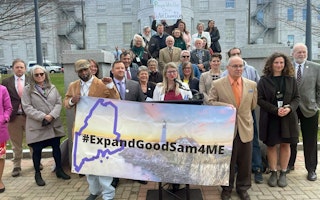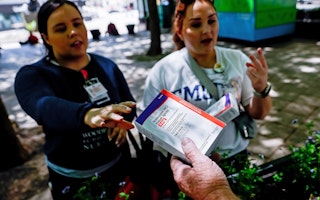In Drug Policy Debates, Youth Are Often Seen but Not Heard
By Sarah Merrigan

“Young people use drugs.”
Delivering the youth statement to the plenary at the 59th Commission on Narcotic Drugs (CND), Sara Velimirovic, a young Serbian woman studying in Paris, spoke these words as a reminder. The subtext was evident: no matter what prohibitionist policies you put in place, the simple fact that young people use drugs will not be altered, so focus on efforts that work with it.
Speaking on behalf of a global coalition of youth drug policy reform organizations, Velimirovic was met with resounding applause at the end of her speech from the country delegations and civil society observers in the room. Her contribution seemed to highlight the fact that, while young people are often invoked in debates about drugs, we’re rarely invited to participate in those discussions ourselves.
At the CND, held last month at the United Nations Office at Vienna, that changed. Young organizers presented the results of the Global Youth Coalition Consultation [PDF] at a forum titled Protecting the World’s Youth from Drug Policy [video]. Discussing issues ranging from harm reduction to education to human rights, the panelists made it clear that, contrary to popular belief, young people know what we want—and, in this case, we want drug policies to start making sense.
For starters, legislation like the RAVE Act in the United States—which criminalizes harm reduction practices targeted at youth who use drugs at festivals—must be opposed. We cannot in good conscience allow young people to die from heat stroke because event organizers and venue owners fear criminal prosecution simply for providing free water and an air-conditioned space in which to cool down. Further, drug-checking services must be available for use in nightlife settings; campaigns such as What’s in the Powder can save lives, but only if they are given the chance to do so.
Sensible, youth-focused drug policy also means developing drug education curriculums that are not grounded in scare tactics but in objective, age-appropriate information. Programs that teach children that all illegal drugs are equally harmful, for instance, do not equip them with the knowledge necessary to make informed decisions in the real world. Time and again, we have seen that stigma is not an effective teaching tool. Yet in drug education programs around the world, young people are taught that people who use drugs are morally deficient.
These morality-based tactics directly contribute to egregious violations of young people’s human rights. The rights to education, privacy, and health services have all been trampled in the name of achieving a drug-free world. As a society, we can no longer allow young people to be used as prohibitionist props while simultaneously ignoring the fact that they are entitled to basic human rights.
The rights of youth residing in countries that supply illicit drugs—particularly those youth engaged in the drug trade—must also receive special consideration. For example, the militarization of schools in Mexico due to a fear of cartel violence impedes the right to education.
Further, any efforts to achieve the UN’s Sustainable Development Goals by 2030 must be accompanied by a fundamental shift in drug policy. Reducing inequality within and among countries, and promoting just, peaceful, and inclusive societies, will remain nothing more than a pipe dream if steps toward reform are not taken at this month’s United Nations General Assembly Special Session on drugs (UNGASS).
Just before UNGASS begins, students from 17 countries on five continents will gather at the 2016 Students for Sensible Drug Policy Conference to discuss the current state of drug policy and our visions for a postprohibition future. Instead of being tokenized, young people will lead conversations about drug policy and immigration reform, the power of peer education programs, ethical drug consumption, and so much more.
Then, on Monday, April 18, hundreds of students will arrive in New York City to demonstrate together outside the UN. Gathering in Dag Hammarskjold Plaza, we will use artwork, soapbox speeches, and performances to amplify youth voices and allow young people to express their frustrations.
The motto of UNGASS is “A Better Tomorrow for the World’s Youth.” But it is our sincere hope that those in New York on April 18 will join us in calling for a better tomorrow with the world’s youth, incorporating the voices of those very people for whom this debate purportedly benefits. No longer will we allow ourselves to be seen, but not heard.
Students for Sensible Drug Policy is a grantee of the Open Society Foundations.
Sarah Merrigan is on the board of directors at Students for Sensible Drug Policy.


